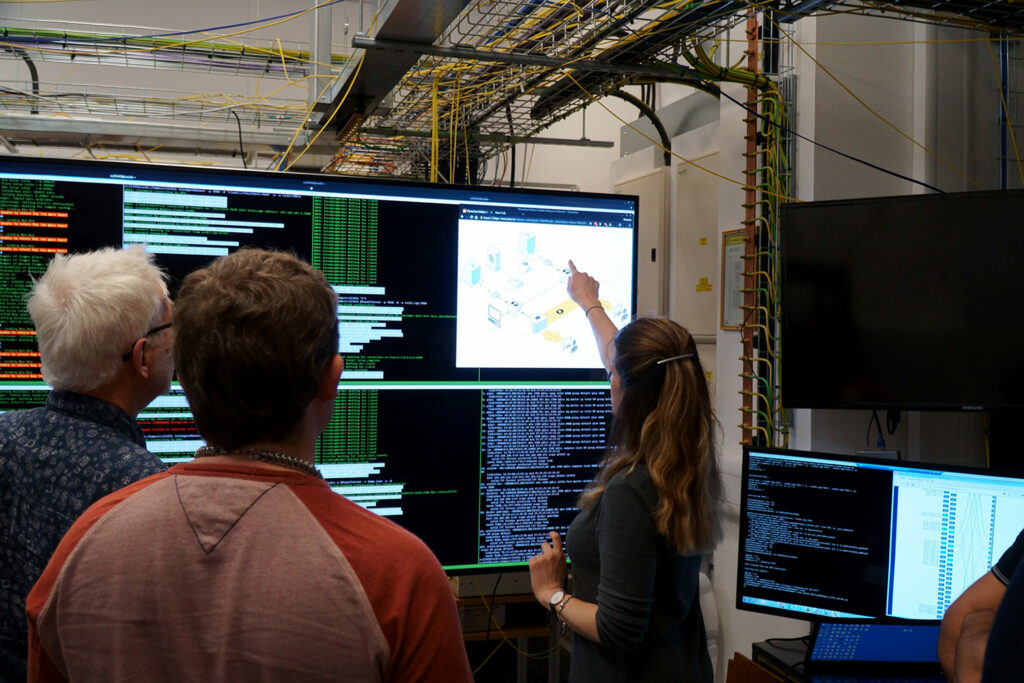The EPSRC Quantum Communications Hub, funded through the UK National Quantum Technologies Programme, is advancing the UK's future communications capabilities through the establishment and further development of the UK's first quantum networks.

Threats to current cryptographic techniques created by major advances in quantum computing are widely acknowledged as both real and forthcoming. Although quantum computers large enough to undertake hacking do not yet exist, retrospective decryption (where information encrypted with current cryptographic techniques is intercepted, stored and decrypted at a later date) is a very real concern and critical data requiring long-term security should be protected now.
Quantum communications technologies are attracting a lot of interest due to their potential to protect sensitive data and transactions from future and increasingly elaborate cybersecurity threats. The Quantum Communications Hub is developing a number of such quantum technologies and is implementing quantum networks to enable their rollout, testing, scalability and integration with conventional communications.
In collaboration with industrial partners Toshiba and ID Quantique, Hub researchers have established the UK’s first fibre-based quantum network, or UKQN. This comprises multi-node metropolitan (‘metro’) networks in Bristol and Cambridge and 410km of National Dark Fibre Facility linkage between these. The UKQN supports R&D, providing a testbed for the integration of quantum-safe and conventional communications technologies. Working with BT, ADVA, and ID Quantique, the Hub extended the UKQN by establishing UKQNtel, connecting the Cambridge ‘metro’ network to the telecommunications industry at Adastral Park, Ipswich. The UKQNtel utilises previously installed standard commercial optical fibre, providing a real-world environment for field trials of new quantum secure communications technologies and systems.
 The Hub is continuously exploring technical innovations to address existing quantum network constraints, such as noise, distance, and the requirement to add new quantum functionality. Hub teams are extending the UK’s national networking capability by: developing novel architectures for the integration of classical and quantum communications; operating technology trials and demonstrations; and engaging with users. Using the Bristol ‘metro’ network, Hub researchers have demonstrated the first experimental quantum-secured, software-controlled network orchestration. This shows that purpose-built hardware appliances can be replaced with standard, off-the-shelf IT network infrastructure, resulting in an adaptable, manageable and cost-effective approach to network architecture.
The Hub is continuously exploring technical innovations to address existing quantum network constraints, such as noise, distance, and the requirement to add new quantum functionality. Hub teams are extending the UK’s national networking capability by: developing novel architectures for the integration of classical and quantum communications; operating technology trials and demonstrations; and engaging with users. Using the Bristol ‘metro’ network, Hub researchers have demonstrated the first experimental quantum-secured, software-controlled network orchestration. This shows that purpose-built hardware appliances can be replaced with standard, off-the-shelf IT network infrastructure, resulting in an adaptable, manageable and cost-effective approach to network architecture.
Speaking about Quantum Communications Hub’s work, Director, Professor Tim Spiller said:
“A crucial next step for quantum communications is the acceleration of commercialisation, driven by growing market pull for competitive new technologies and services. In the Quantum Communications Hub, we continue to leverage the UK Quantum Networks and collaborate with our industry partners to pursue this important step.”
Practical entanglement distribution is crucial to bring the quantum internet a step closer to reality. Hub researchers have used entanglement to demonstrate a trusted-node-free, eight-user, ‘metro’ quantum network. They have also demonstrated the first quantum secured conference call, via Quantum Conference Key Agreement. This used multi-party entanglement to share an encrypted image between four parties, separated by 50km of optical fibre.
Wider use of entanglement, along with additional quantum functionality such as memories and repeaters, are the next R&D challenges to take the quantum networks of today towards the quantum internet of the future.
